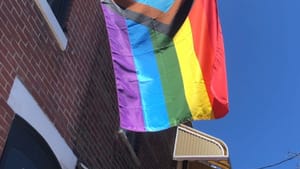Stay in the Loop
BSR publishes on a weekly schedule, with an email newsletter every Wednesday and Thursday morning. There’s no paywall, and subscribing is always free.
I’m comfortable with myself. Are you?
I date people of different genders, but let's skip the labels about sexuality

By and large, I hate dating. Sure, there are things I like as much as anyone: the butterflies-in-the-gut excitement of meeting someone new, the rush of exhilaration as conversation turns to kissing, the joy of sharing a moment, the hope of sharing a lifetime… It’s the other stuff. The stuff where you’re expected to divulge your desires and the details of your romantic history and then have to deal with other people’s reactions.
It’s never been a problem for me to reconcile within myself that I’m a woman who’s attracted to men about 70 percent of the time, and other genders the rest of the time. The reactions of other people, on the other hand, have made it challenging to talk about this.
An exhausting relationship
So far, all the women I’ve dated have been threatened by my sexual fluidity. They have tended to assume that, because I’m not gay, I’m likely to commit infidelity at any moment. This was an insurmountable problem in a five-year relationship I had with a woman. We were in love. We lived together, we built a life together, we talked about marriage, but she was so threatened by my sexual orientation that it seemed as if we couldn’t go a week without fighting about whether or not I’d eventually leave her for a man. The relationship was exhausting, and her fears around my orientation ultimately led to a brutal breakup. Although we’re on good terms now, and she got married a year or so ago, I feel further from the altar than ever. I’ve been in a couple relationships, but long-term love hasn’t been in my stars.
So far, no one I’ve been romantically involved with has ever understood my fluid orientation. They understand other things about me, but never that. I’m not sure they have to, but it would be nice if people I’ve met and dated and gotten to know were comfortable enough with themselves that they could be comfortable with my sexuality.
The trouble with labels
I call myself sexually fluid now, but in the past, I’ve tried on bisexual and pansexual. I’m not sure it makes much of a difference within me, but I’m tired of external reactions claiming that bisexuality means splitting your desires evenly between men and women—and this paradigm also didn’t seem to account for other gender identities. Pansexual didn’t seem to fit me either, maybe because I don’t feel as if my attractions are evenly distributed between different genders. I keep bumping up against the limits of language, which I know is why a lot of people refer to themselves as queer—but when I’ve used that word in reference to myself, anyone unfamiliar with the terminology looks at me askance.
It’s been challenging to figure out where or how I fit in, and there does seem to be something more fluid about my experience in that I tend to move into and out of various forms of connection and romance. And my fluidity doesn’t stop me from craving connection, commitment, and monogamy with the right person—whoever that may be.
Just finding myself?
Since my ex and I split up, I’ve dated only men. It’s easier in some ways. In others, it’s not. Women have never challenged or dismissed my attraction to men. But with the men I’ve met, it’s repeatedly felt as if my sexual orientation has been minimized or dismissed. Occasionally, it’s been a source of prurient fascination (no, I’m not describing the details of my past sex life.)
Every time I interact with a new prospective male partner and the conversation turns to exes, he’ll say, “How long were you with him?” or “What did he do for a living?”
“Her,” I’ll answer. “My last long-term relationship was with a woman.”
Invariably, there’s an awkward pause, after which they’ll often mansplain my own sexuality to me.
“Yeah, well, that’s okay. A lot of women experiment” or “Don’t worry, I’m not threatened” or “You were just finding yourself.”
They dismiss my romantic past as irrelevant to who I am or how I feel, and I find myself in the awkward position of wanting to fight to take up space as a member of the LGBTQIA+ community while, at the same time, not wanting partners to think they won’t be enough or that I’ll seek sexual satisfaction elsewhere (a harmful stereotype applied to many people like me). Even if I’ve taken the time to share about my sexual fluidity, or the spectrum of my physical and emotional attraction, none of the men I’ve dated have really gotten it—and, therefore, none of them has ever fully gotten me.
An ally on the inside
I understand, of course, that as a straight-passing, cisgender person, I won’t ever know the pain suffered by so many other members of the LGBTQIA+ community. At the same time, there are many things I wish could be different for myself and for those whose feelings and experiences mirror my own. For now, I’d settle for meeting a person who accepts that I might see myself not as fitting squarely within definitions of lesbian, gay, bisexual, trans, queer, intersex, or asexual. And although I am an ally, I’m more than that. I’m also an insider, and that is an integral part of my identity.
Sign up for our newsletter
All of the week's new articles, all in one place. Sign up for the free weekly BSR newsletters, and don't miss a conversation.
